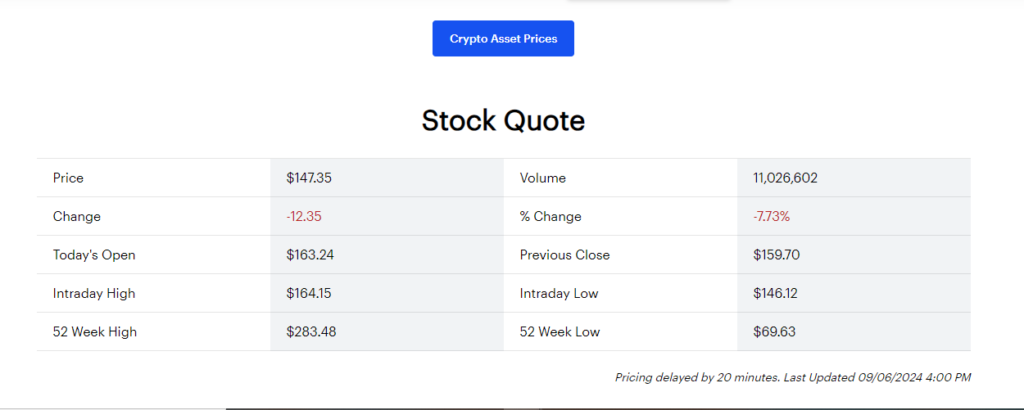-
Block Inc. just exceeded Coinbase in market value, sparking industry interest.
-
Legal challenges and market instability have hurt Coinbase’s market value and stock performance.
-
Barclays upgraded its investment attitude from underweight to equal weight after Coinbase’s shares was under pressure after winning an SEC lawsuit.
The crypto community is an ever-expanding franchise, steadily transforming technology as we know it. In less than two decades, blockchain technology has ushered in a new era of innovators, investors and enthusiasts, leading to the steady growth of the crypto community.
Amid this growing ecosystem, several names have stood at the top of the food chain, with the majority of the pie. Coinbase, Binance, Ethereum, and Kucoin have dominated the market via events, partnerships, easy-to-use services, and higher reach.
Unfortunately, what goes up must come down, and a new titan has emerged: Block Inc., a renowned financial service provider, has sent shockwaves throughout the industry. The organization’s tactics and strategy have eventually surpassed Coinbase in market capitalization.
Many claim that Coinbase’s market cap took a substantial hit during its trial, with the SEC allowing Block Inc. to swoop in and take its positions. Coinbase’s legal victory over the SEC may have proven its innocence, but its reputation still has some ways to recover.
Block Inc. Usurps Crypto Titan Coinbase
The crypto community has rapidly grown over the past decades. What started as a hoax with only a few believers soon transformed into a $2.22 trillion franchise erupting with many new startups and exchanges.
Block Inc. is no different; the company behind Square and other fintech ventures has finally gained enough traction within its market capitalization to grasp Coinbase, ranked second best by volume.
Also, Read: Robinhood Crypto Settles $3.9 Million Over Blocked Withdrawals: A Win for Crypto Traders.
This shift comes at a turbulent time for the crypto titans, as Coinbase’s market cap has experienced a steady decline over the past few months. According to experts, Coinbase’s stock has recently gained a steady decline, causing its crypto prices to all mark this week as their worst so far.
The shift in market capitalization positioning showcases the broader volatility that most exchanges navigate within the crypto sector. This, however, comes as no surprise given the rivalry between both firms.
For instance, in April 2021, when Coinbase went public via direct listing, it featured one of the highest valuations in crypto history at $100 billion. At the time, this was the first declaration of war between the firms, given that Block, formerly Square, had a valuation of $120 billion.
Despite the decline in the Coinbase market cap, investment bank Barclays adjusted its stance on the crypto titan from underweight to equal weight. Generally, this indicates that Barclays has shifted its perspective on Coinbase from anticipating its stock to underperform against other investments to recognizing its stock’s fair valuation. This suggests that shortly, it should perform in line with a broader market within the crypto sector.

Cryptocurrency has broken into several new industries, introducing better financial services and increasing its adoption. This has created a maturing regulatory environment, a steady diversification, and, with more startups, developing industry leadership that factors in a broader use of digital assets.
Also, Read: AI Agents Go Autonomous: Coinbase’s Pioneering ‘AI to AI’ Token Purchase and Its Implications.
Coinbase’s legal victory over the SEC may positively impact its market capitalization, but the war still rages on for crypto exchanges. On March 25, amid this legal debacle, Coinbase’s stock performance reached a year-to-date high of $279.71, closing at $147.35 on Friday.
Later within the year, Coinbase followed MicroStrategy, going down by at least 15% as the global market reacted to disappointing US economic data and escalating tension in the MENA region.
Block Inc.: A Shift to Steady Adoption
Jack Dorsey (former co-founder of X) and Jim McKelvey first introduced Block Inc. to the world as Square in 2009. During this time, mobile money picked up thanks to companies like PayPal and Mpesa, and Bitcoin officially launched.
Initially, as Square, Jack and Jim focused their efforts on providing small businesses with affordable ways to accept credit card payments via a mobile card reader. Since Square was roughly a pioneer of the mobile money industry, it picked up rapidly, and in 2015 the company went public under the ticker symbol SQ with its market capitalization growing steadily.
It wasn’t until 2013 that the organization joined the blockchain community, further promoting Cash App and introducing crypto payment services to its customers.
Soon, Block Inc. gained enough traction to compete with top crypto titans like Kucoin and Kraken. During this period, Web 3 had penetrated several industries, showcasing that blockchain could transform more than the financial industry.
In 2021, Square rebranded to Block Inc., refocusing its focus on blockchain technology, cryptocurrency and decentralized finance. Within the same year, the organization heavily invested in Bitcoin infrastructure, developing mining tools, hardware and wallet services.
According to its official page, Block Inc.’s vision for the future of Web3 focuses on decentralization and giving users control over their data.
With the organization now surpassing Coinbase in market capitalization, it sets a new pace for its plans. You never know; Block Inc. may dominate the market.
